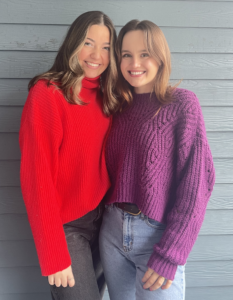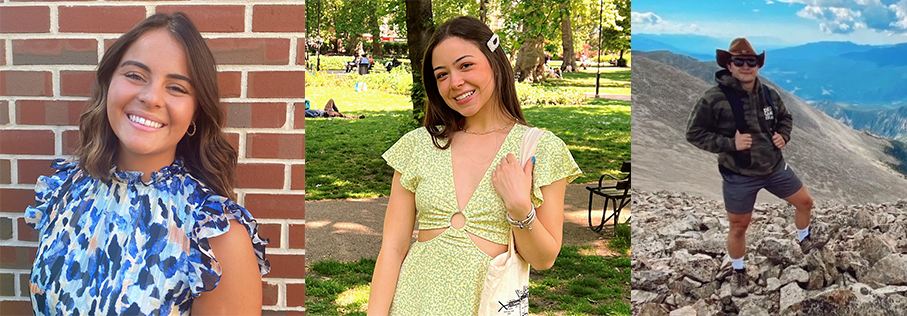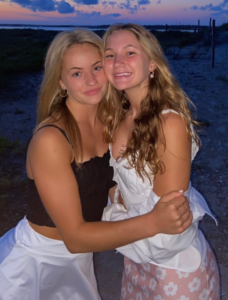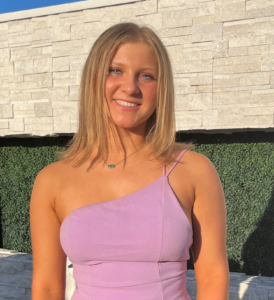Romantic relationships can be complex, and often leave people with more questions than answers.
How does social anxiety impact romantic relationship formation? Is “taking a break” good for your mental health? If your sibling doesn’t approve of your relationship, could that spell the end? And why do so many couples fight about social media?

With guidance from FSU College of Health & Human Sciences faculty member Mickey Langlais, Ph.D., undergraduate students interested in human development, adolescent health, psychology, medicine, marriage and family therapy and others, seek to find answers to common questions people have about romantic relationships.
“These undergraduate students are highly motivated. They’re excited,” said Langlais, teaching faculty in the Department of Human Development and Family Science. “It’s been amazing to see their ideas come together, and all the projects that we’ve done collaboratively are things that have not really been researched before.”
For many students, working with Langlais has been their first hands-on experience with scholarly research.
“I never really saw myself doing research but when this opportunity came up, it sounded really interesting,” said Abbigail Rahm, a senior psychology major with a minor in child development. “It’s a rigorous process and there’s a lot that goes on behind-the-scenes with IRB approvals and other processes, but Dr. Langlais is so patient with us as students and really took the time to explain everything.”
Now, many of the student teams conducting research with Langlais and the Department of Human Development and Family Science are preparing to travel to conferences to present their work. Six are heading to the Florida Undergraduate Research Conference in Miami on Feb. 17-18. Ten students will be presenting at the Society for Personality and Social Psychology (SPSP) annual convention in Atlanta at the end of the month.
“I’ve learned so much from the process and feel really lucky,” Rahm added.
Social anxiety and romantic relationships: What’s the role of technology?
Rahm and junior Bianca Hamm studied how individuals with social anxiety form romantic relationships.
“We had three main questions,” Hamm said. “What helps people with social anxiety feel comfortable in romantic relationships? How do people with social anxiety approach forming romantic relationships? And how has technology affected the way people with social anxiety communicate and form relationships?”
The duo, with help from other student researchers, distributed a 100-item survey to participants and used a social anxiety questionnaire to identify participants who score higher in social anxiety. Those that had high scores were invited to participate in an anonymous online chat to discuss their relationship experiences.
Their research showed that while socially anxious people may rely more on technology as a means of communication, participants also had concerns about how it could impact their relationship formation.

“You might think that socially anxious people would say technology is great because it makes them more confident, more comfortable, and gives them an avenue to talk to more people, but a lot of negative themes also came up,” said Hamm, who is majoring in communication science and disorders and minoring in child development. “People said that it makes in-person communication more difficult, and it does hinder their ability to talk to others in person.”
Hamm and Rahm also found that participants were more hesitant to trust others when communicating through technology.
“We found that people with social anxiety like to keep their relationships more private and they really value the sense of security and trust,” said Hamm. “We were surprised how many said they still feel the need to see someone one-on-one in person to form a more genuine connection. They also said that in-person, they would use things like body language and eye contact to flirt, which was interesting because it’s not typically what people who don’t have social anxiety would say; it would be more touching and verbal and less subtle.”
The pair also reported that participants who were not classified as socially anxious still shared negative feelings toward the use of technology and social media in relationship formation as well.
“They seemed to share the feeling that social media interactions make in-person communication more difficult,” said Rahm. “I think something everyone can take away from it is to reflect on our social media and technology usage and how it might be affecting us and our relationships.”
Rahm and Hamm will be presenting their research at the SPSP annual convention in Atlanta at the end of the month.
Is “taking a break” in romantic relationships good for one’s health or their relationship?
Anxiety, stress, trouble sleeping, trouble focusing, and depressive symptoms are commonly reported among people going through breakups from romantic relationships. But what about people who are simply, ‘taking a break?’ – do they experience the same outcomes?
Seniors Laina Parry, Emily Sanudo and Hamilton Reese collaborated on research to help answer that question.
“The process was a lot of interviews, starting with interviews asking people what it means, in their opinion, to ‘take a break,’” Parry said. “It was often explained as a temporary breakup, or just kind of taking space from each other, typically to work on a specific issue with the goal of coming back together after to reanalyze the relationship.”
Parry specifically looked at how boundary setting during temporary breakups can affect a person’s physiological health.
“Some people went on breaks and didn’t set any boundaries at all, and other people set boundaries to only talk at night, not talk at all, not see other people, that sort of thing – and they were very strict with it,” Parry said.
Their research found that most people had limited or no communication while taking a break and set boundaries against seeing other people, which was tied to more negative physiological effects related to stress and anxiety.

“I was expecting to see more symptoms of stress among people who said their partner could have relationships with other people during the break, but that was kind of flipped,” Parry said. “But if you’re on a break, that typically means there’s something going on in your relationship that’s not ideal, and that could mean trust is at a minimum, especially if you’re setting a boundary against seeing other people.”
Sanudo analyzed levels of self-esteem before, during, and after a temporary breakup, and how self-esteem impacted physiological and psychological health.
“We did notice a decrease in self-esteem during the temporary break, then an increase after the break, which is what you would probably expect to see,” said Sanudo. “There’s an increase in self-esteem after because they learned how to improve their relationship or they ended relationships that were not healthy for them anymore.”
The research team will also be presenting their research more in-depth at the SPSP annual convention in Atlanta at the end of the month, while Sanudo will also be attending the FURC conference later this week.
“Overall, the research allowed us to observe how different individuals cope with a break from their relationship as well as what coping methods were effective and healthy,” said Reese, a senior exercise physiology major who was interested in how temporary breakups might impact trouble sleeping, loss of appetite, and general physiological well-being.
“It also showed us what types of romantic relationship breaks panned out to be more successful in comparison to the relationships that resulted in a full break-up afterward.”
How does sibling approval impact romantic relationships?
Another pair of student researchers, Katie Ayers and Leah Natkin, are studying the impact sibling approval can have on romantic relationships.

The team is still analyzing the data but found some early trends and directions for this research.
“A lot of the study is very situational because there’s so many variables to consider like how close someone is with their sibling, what their relationship looks like, and if there’s a significant age gap,” said Natkin, a Human Development and Family Science student from Atlanta.
Ayers and Natkin collected data from a survey completed by both the study participant and their sibling to analyze relationships satisfaction and perceived satisfaction.
“We were looking at how satisfied participants actually were with their relationship, then how much their sibling thought they were satisfied,” said Ayers, a junior clinical professions major from Pennsylvania. “We found that the sibling perceived the participant as being less satisfied in their relationship if the sibling didn’t like the person, but it had nothing to do with how satisfied they actually were.”

Participants provided a variety of reasons for disapproving of their sibling’s relationship, many focusing on the romantic partner not getting along with the family, frequent arguments within the relationship, or being dishonest.
The research team conducted interviews as part of the study.
“Something that surprised me was that a lot of participants said they would withhold information about their relationship from their sibling until after the relationship was over,” said Natkin.
Ayers found that sibling approval mattered more to participants once their relationship ended. While individuals were in a relationship, their sibling’s approval didn’t impact them as much.
The students will be presenting their research at the Society for Research on Adolescence annual meeting in San Diego later this year, and at the Florida Undergraduate Research Conference in Miami later this month.
What is appropriate and inappropriate to do on social media when in romantic relationships?
Junior psychology major Cori Watkins, who is minoring in child development, found a similar theme within her research on social media usage and romantic relationships.
Watkins studied people’s differing views on what is considered appropriate and inappropriate use of social media when in a relationship and discovered a wide range of viewpoints.
“I was drawn to this because I know people have such different opinions on what you should and shouldn’t do or post on social media when you’re in a relationship, and I wanted to see if there was a general consensus on what people think is OK,” she said.

The St. Petersburg native conducted interviews and focus groups asking participants what kind of social media engagement and usage they’re comfortable with; should you remove pictures of previous partners from social media profiles? How often should you post pictures with your partner? Can you ‘like’ certain posts from other people?
“I was surprised to see how many people have very strong opinions about it, and a lot of them are very different,” she said. “In our focus groups, almost all of our participants reported some sort of conflict they had over social media within their relationship, whether it was an issue with either posting, or commenting, or other things they experienced.”
Watkins is particularly interested in research on social media and adolescents, and its impacts on relationships, mental health, and kids. She hopes to expand on the research she’s already conducted and is looking forward to presenting her work at the FURC conference this week.
“I think when you start a relationship, talking about social media is so important,” she added. “We’re talking about doing more of a quantitative study too, now that we have a feel for people’s opinions.”
In addition to presenting their research at conferences and events, many students are looking to apply their knowledge to their future careers.
“I love learning about how people interact and different aspects of human actions,” said Parry, who hopes to become a physician’s assistant. “I want to be able to get to know my future patients and be able to look at some psychology behind what’s going on in their lives and how things like stress might be impacting their health.”
Meanwhile, Langlais hopes more undergraduate students pursue research to help build on their academic interests.
“I think some people get turned off by the word research, or intimated by research,” he said. “But I think if you find something you’re truly interested in, you’re going to be a lot more invested in it, especially for undergraduates.”
